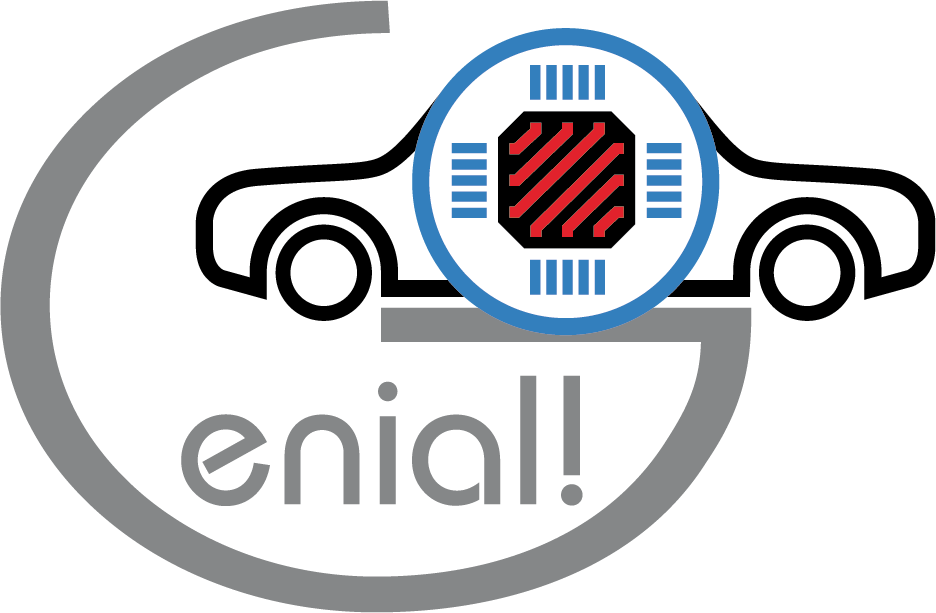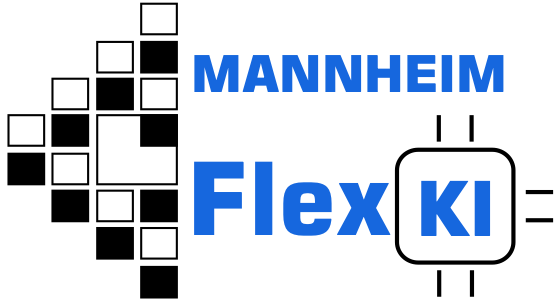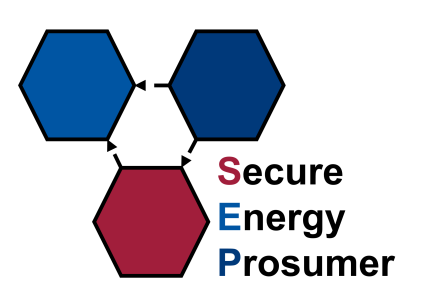Forschung
Aktuelle Forschungsprojekte
GENIAL! - Gemeinsame Elektronik-Roadmap für Innovationen der automobilen Wertschöpfungskette

Ziel des BMBF-Projekts GENIAL! ist die Erforschung einer Wertschöpfungsketten-übergreifende Plattform zur effizienten Abstimmung von Anforderungen, Eigenschaften und der Analyse der Leistungsfähigkeit von Systemarchitekturen und Anwendungen in künftigen Automobilen. Der Fokus liegt dabei auf der strategischen, der Produktentwicklung vorgelagerter Ebene, um innovative und hochqualitative Fahrzeugkomponenten auf Basis neuester Fertigungstechnologien wesentlich früher und passgenauer als bisher marktreif bereitstellen zu können.
More about this projectM/EDGE - Secure Low Power Medical Edge Computing

Mit dem Projekt M/EDGE soll eine Elektronik-Plattform für hochintegrierte medizinische Edge-Intelligenz entwickelt und für die Multisensor-Kapselendoskopie sowie für Neuroimplantate prototypisch realisiert werden.
More about this projectMANNHEIM-FlexKI - Flexibles KI-Deployment und KI-Plattformen für eingebettete, automotive Anwendungen

Das Projekt FlexKI hat zum Ziel die Hardware-Abhängigkeit aktueller Entwicklungsprozess für KI-Anwendungen zu durchbrechen und einen offenen Referenz-Ansatz für das Deployment von KI- und DSP-Anwendungen zu erforschen.
More about this projectSEQUOIA - Software Engineering industrieller, hybrider Quantenanwendungen und -algorithmen

Im Projekt SEQUOIA werden neue Methoden, Werkzeuge und Vorgehensweisen für das Quantencomputing erforscht, entwickelt und erprobt, um zukünftig die industrielle Nutzung in verschiedenen Anwendungsbereichen wie zum Beispiel in der Fertigung, der Entwicklung, oder der Logistik zu ermöglichen. Im Fokus stehen hybride Quantenanwendungen und -algorithmen sowie ein Quantensoftware-Komponentenbaukasten als Grundlage für die Umsetzung von Anwendungskomponenten, Demonstratoren und das Software-Engineering.
More about this projectScale4Edge - Skalierbare Infrastruktur für Edge-Computing

Ziel von Scale4Edge ist die Entwicklung und Bereitstellung eines Ökosystems für eine skalierbare und flexibel erweiterbare Edge-Computing-Plattform, welches auf der freien RISC-V-Instruktionssatzarchitektur basiert.
More about this projectAbgeschlossene Forschungsprojekte
Autojail - Automated Configuration of the Jailhouse Hypervisor Supporting Virtualized Network Interfaces for ARM Architectures
More about this projectCOMPACT - Cost-Efficient Smart System Software Synthesis

The Internet of Things (IoT) forms the basis for future intelligent networked innovations in the private and industrial sector, just as they are part of the German Industry 4.0 strategy. The IoT consists of a large number of networked IoT nodes, where the greatest challenges are in the creation and maintenance of the software, since the software has to guarantee its security, configuration and adaptability over a long period of time in addition to the actual function of the nodes. Current approaches from the standard software design and the design of embedded systems are not competitive due to the extreme hardware restrictions and the high requirements of IoT nodes in operation.
More about this projectCONFIRM - Automatic Firmware Design for application-specific Electronic Systems

CONFIRM is a cluster research project consisting of seven research partners who are researching key aspects for an efficient, automated design of firmware that is designed specifically for the hardware conditions of the system, but also for application scenarios. For this purpose, common hardware firmware models are developed, which allow abstract optimization with respect to various parameters. Based on this, a new design method is developed and with the aid of this a firmware can be created automatically and can be adapted for the system configuration and the usage profile.
More about this projectEffektiV - Effiziente Fehlereffektsimulation mit virtuellen Prototypen zur Qualifikation intelligenter Motion Control Systeme in der Industrieautomatisierung

Gemeinsam mit Partnern aus Industrie und Forschung entwickelt die Universität Tübingen in diesem durch das Bundesministerium für Bildung und Forschung geförderte Projekt eine Prüfmethode für komplexe Industriesysteme.
More about this projectFastTimeSim - Fast timing simulation of embedded software based on its target architecture
Aim of this project is to carry out research work and prototypical implementations to support the client in the development of a simulation environment for embedded software that allows the inclusion of non-functional properties -in particular the consideration of timing behavior- of the underlying processor architecture.
More about this projectFaultSimHiL - Multi-domain fault simulation using virtual prototypes and HIL-integration
More about this projectHardVERITESS - Erforschung neuartiger FPGA-Basisarchitekturen und deren Erprobung am Beispiel eines Datenloggers
More about this projectISO-Check - Automatisierte Überprüfung der RTE-Generierung zur Qualifizierung gemäß ISO26262
Der Gegenstand dieses Einzelvertrags zum Thema „Automatisierte Überprüfung der RTE-Generierung zur Qualifizierung gemäß ISO26262 (ISO-Check)“ ist die Durchführung von Forschungsarbeiten und prototypischen Implementierungen zur Unterstützung der Firma Vector Informatik bei der Entwicklung einer Verifikationsumgebung zur Überprüfung der AUTOSAR RTE-Generierung für eine Qualifizierung gemäß ISO26262.
More about this projectOCEAN12 - Opportunity to Carry European Autonomous driviNg further with FDSOI technology up to 12nm node

For the last years, electronic components become more and more widespread in the automotive industry. Today they create a superior value for the final customer and represent an important vector of differentiation in the industry. The sharing economy model, which drives innovation strategies in Smart mobility, will further increase the need for safe, cost efficient, secure, reliable and unhackable operations. This will enlarge costs of electronics and software in the total cost of a vehicle.
More about this projectRESIST - Resilienzbewertung von Wahrnehmungs- und Planungsansätzen in kooperativ interagierenden Automobilen bei unerwarteten Störungen
Cooperative interacting vehicles are an important step towards fully automated driving. However, a broad applicability ranging from highway to city traffic at different seasons and daylight situations, bring up manifold risks. To guarantee safety and robustness considerations, new methods for validation and evaluation of all sensor data that have been aggregated within a common event horizon are necessary. Special care has to be taken with respect to the resilience against unexpected disturbances originating from the environment, weather conditions or faulty communication channels. Recent methods for validation, e.g. by recording real test data, seem to have reached the limits of complexity due to the huge number of possible environmental conditions. The required standard qualification process would imply the need of roughly one billion kilometers of test driving according to latest industrial sources.
More about this projectRESIST II - Resilienzbewertung von Wahrnehmungs- und Planungsansätzen in kooperativ interagierenden Automobilen bei unerwarteten Störungen
Functional safety of fully automated and autonomous vehicles is one of the main challenges of the upcoming years. A fully automated vehicle must not only remain in a safe driving state under ideal conditions, but also in the event of unforeseen situations. The use of cooperatively interacting strategies further complicates ensuring sufficient resilience against these unforeseeable situations and unexpected disturbances. To qualify a vehicle with fully automated driving functions in accordance with ISO 26262, it currently has to complete one billion test kilometers on the road.
More about this projectSATiSFy - Frühzeitige Validierung von Safety- und Security-Anforderungen in autonomen Fahrzeugen

Mit dem Einzug des autonomen Fahrens in zukünftigen Automobilgenerationen wird eine Vielzahl von komplexen Systemkomponenten in eine Wirkungskette gebracht – ein jegliches Fehlverhalten des Systems kann dabei lebensbedrohlich sein. Potentielle Angriffe von außen stellen daher eine besondere Bedrohung für diese Systeme dar, so dass jegliche Safety- und Security-Anforderungen unbedingt in Kombination betrachtet werden müssen. Da klassische Entwicklungsprozesse hierfür unzureichend sind, müssen mittels formaler Methoden frühzeitig im Entwicklungsprozess Sicherheitsgarantien integriert werden, mit denen Komponenten einzeln und in ihrer Komposition validiert werden können.
More about this projectSecureEnergyProsumer - Sichere Kommunikation in Smart Grids mit Prosumern in einem dezentralen regenerativen Energiesystem

Das Projekt SecureEnergyProsumer wird eine sichere Informations- und Kommunikationsstruktur für ein dezentrales Energiesystem auf Basis von Prosumern abbilden, welche vielfälltige verteilte Energiesysteme wie PV-Anlagen, steuerbare Lasten, Batteriespeicher und E-Ladeinfrastruktur nutzen und betreiben.
More about this projectTHINGS2DO - THIN but Great Silicon 2 Design Objects
The program THINGS2DO is focused on building the Design & Development Ecosystem for FD-SOI-technology. This technology is uniquely positioned to take advantage of some very distinct strengths of the European Semiconductor Industry. The baseline 28nm FD-SOI-technology is available at an inflection point in the semiconductor progression path and offers unique features at this particular point in time. 14nm-FD-SOI will then take the technology’s integration potential to unprecedented levels, utilizing the design/development ecosystem developed here.
More about this projectVideoSim - Modellierung und Variation von Umgebungseinflüssen auf Umfeldsensorik
Durchführung von Forschungsarbeiten zum Aufbau einer prototypischen Simulationsumgebung zur Einbringung von Umweltbedingungen (Witterung, Beleuchtung, Verschmutzung) in synthetisch generierte Videodaten zur Repräsentation realitätsnaher Versuchsfahrten. Ferner soll eine systematische Auswertung der erzielten Ergebnisse durchgeführt, und ein Quervergleich mit Echtdaten vorgenommen werden.
More about this projectautoSWIFT - Schnellere Innovationszyklen für Elektroniksysteme entlang der Automobilwertschöpfungskette
Die schnelle und sichere Realisierung neuer, innovativer Fahrzeugfunktionen stellt die deutschen Automobilhersteller und ihre Zulieferkette zunehmend vor enorme Herausforderungen, die nur über eine neue Qualität der Zusammenarbeit bewältigt werden können. In autoSWIFT werden unter Beteiligung aller relevanten Entwicklungspartner die Grundlagen für eine gemeinsame Technologie- und Applikationsbewertung von Fahrzeugkomponenten erforscht, bewertet und anhand von innovativen Demonstratoren exemplarisch verifiziert. Es werden zudem die methodischen Grundlagen für eine verzahnte entwicklungspartner- und domänenübergreifende Entwicklung von Fahrzeugkomponenten entwickelt und bewertet. Die Universität Tübingen erforscht im Unterauftrag der Infineon Technologies AG eine Modellierungs- und Simulationsmethodik zur frühzeitigen Technologiebewertung und Applikationseignungsprüfung von Halbleiterbauelementen in künftigen Automobilen.
More about this project